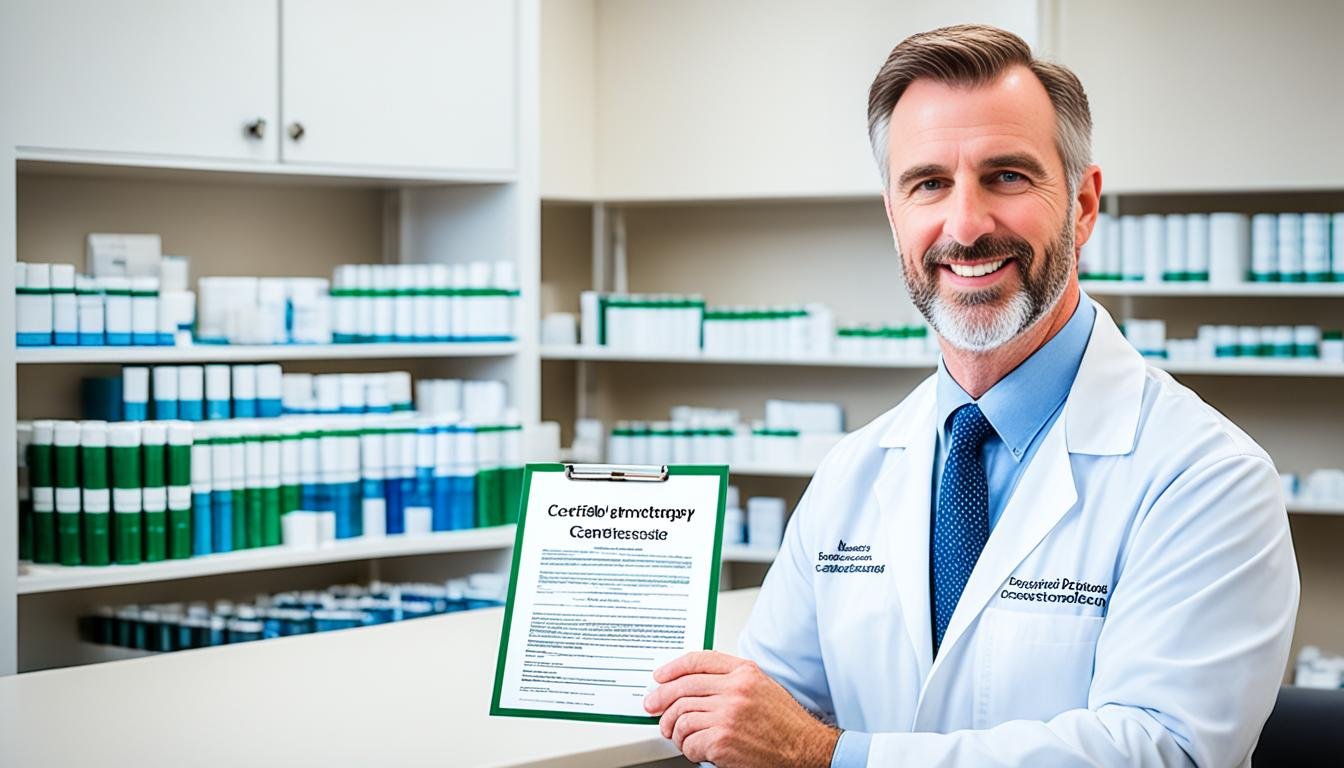What is a Board Certified Pharmacotherapy Specialist (BCPS)?
Did you know there is a certification showing expertise in pharmacotherapy? It’s the Board Certified Pharmacotherapy Specialist (BCPS) certification. It is vital for improving patient care and managing medications. So what is a BCPS and how does one become certified?
Becoming a BCPS requires meeting specific qualifications and passing an exam. The Board of Pharmacy Specialties (BPS) awards this certification, a known expert in pharmacy. BCPS professionals are highly skilled. They manage medication therapy and patient care, especially for those with complicated medical needs.
Are you keen on the BCPS role, its requirements, exam details, and what it offers in careers? Keep reading. You’ll learn how getting Board Certified as a Pharmacotherapy Specialist can elevate your pharmacy career!
Key Takeaways
- A Board Certified Pharmacotherapy Specialist (BCPS) is a pharmacist with advanced knowledge and skills in pharmacotherapy and patient care.
- To become a BCPS, individuals must meet specific qualifications and pass the BCPS exam.
- BCPS professionals play a vital role in advancing patient care, medication management, and optimizing therapeutic outcomes.
- BCPS certification offers career opportunities, higher salaries, and professional recognition in the field of pharmacy.
The Role of a BCPS
A Board Certified Pharmacotherapy Specialist (BCPS) is key in advancing patient care. They focus on managing medications for patients with complex health issues. This ensures the right medicines are chosen and used safely. They work closely with healthcare teams, offering their knowledge to create the best treatment plans.
Collaborative Patient Care
BCPS professionals actively join healthcare meetings and rounds. They use their expertise in medications to help develop personal treatment plans. They check each patient’s history and medicines to watch for any issues.
- They assess patients’ medical histories, current conditions, and medication regimens to identify any potential drug-related issues or interactions.
- BCPS professionals provide recommendations on medication selection, dosing, and monitoring, taking into consideration the patients’ unique characteristics and specific disease states.
- They work with other healthcare experts to ensure care is well-coordinated and effective.
Medication Management and Optimization
BCPS specialists are experts in managing and improving medicine plans. They assess, watch, and adjust medicines to get the best results for patients.
“As a BCPS, my job is to keep patients safe and make sure their medicine works well. I review medicines carefully, monitor their use, and make changes as needed, all to help patients live better.” – Dr. Sarah Thompson, BCPS
They have several key tasks:
- They review all medications to spot any problems, like bad reactions or too many similar medicines.
- They watch how patients react to their medicines to ensure they’re working well.
- When necessary, they adjust medicine plans with the healthcare team.
- They teach patients and their families how to use medicines correctly and why it’s so important to follow the plan.
Drug Information and Patient Education
BCPS specialists are also big parts of educating about medicines. They provide the latest, most accurate information to patients, caregivers, and fellow healthcare professionals.
They do the following as part of their job:
- They offer the best drug info to healthcare teams to help them make good decisions.
- They answer questions about medications from healthcare pros, patients, and their families.
- They teach patients how to use medicines the right way, what to watch for with side effects, and how to stick to their plan.
By carrying out these critical duties, BCPS professionals greatly enhance patient care, medication safety, and the positive results from treatments.
BCPS Certification Requirements
To become a BCPS, individuals must follow the BPS’s set requirements. These rules ensure they have what it takes to succeed in the pharmacotherapy field.
Eligibility Criteria
Candidates need to meet several conditions to be BCPS-eligible. These include graduating from an accredited pharmacy program and having an active license. They must also have three years of experience after getting their license. Half of their work should involve pharmacotherapy tasks.
If not all these criteria are met, a PGY1 residency can also qualify them.
The BCPS Exam
Passing the BPS exam is the final step. This test checks a candidate’s real-world application of pharmacotherapy. It covers topics like patient-focused care and evidence-based practices.
The exam also tests system-based care and how to help a whole population with medicine.
Continuing Education
BCPS certification isn’t a one-off. Certified pharmacists must keep learning. They need to take part in workshops and seminars and complete a certain number of educational hours each year.
Recertification
BCPS certification lasts for seven years. After this time, they must get recertified. This can be done by either passing the recertification exam or completing 120 hours of accredited learning.
Career Advancement
BCPS opens many doors in the pharmacy world. Hospitals, clinics, academics, and the pharma industry value these professionals. The certification shows BCPS pharmacists have advanced knowledge and skills.
BCPS Recertification
After you become a BCPS, you must get recertified every seven years. This keeps you up to date on new pharmacotherapy news.
You can get recertified by passing a test or doing continuing education.
- Earning a passing score on the BPS Pharmacotherapy Recertification Examination
- Completing 120 hours of continuing education provided by accredited professional development programs
If you choose the test, you need to study and pass the BPS Pharmacotherapy Recertification Examination.
The ACCP and ASHP have lots of education you can use to get recertified.
Getting recertified helps BCPS give the best care to their patients. It means they know the newest in pharmacotherapy.
BCPS Exam Details
The BCPS exam tests a candidate’s knowledge and skills in various pharmacotherapy areas. Candidates need to pass this exam to be a BCPS certified. Here are the specifics of the test:
- Patient-Centered Pharmacotherapy: This makes up 55% of the exam. It looks at how candidates can use pharmacotherapy for patient care. They must show they can make specific treatment plans, consider patient needs, and improve their health.
- Drug Information and Evidence-Based Medicine: This area is 25% of the test. It focuses on using drug info and medical evidence in practice. Test-takers must prove they can review scientific articles, find helpful drug info, and use it for patients.
- System-Based Standards and Population-Based Pharmacotherapy: Accounting for 20% of the exam, it examines how well candidates understand and apply pharmacotherapy at a system level. They’re quizzed on healthcare systems, making medications safer, improving quality, and working at the population level.
The BCPS exam shows if candidates can practically use their knowledge. It checks their skills in patient-centered care, finding and using drug info and evidence, and working with bigger healthcare systems.
To get BCPS certified, candidates must pass this exam. This certification shows they are knowledgeable and skilled in pharmacotherapy and patient care.
Example BCPS Exam Content Distribution:
| Exam Domain | Percentage of Examination |
|---|---|
| Patient-Centered Pharmacotherapy | 55% |
| Drug Information and Evidence-Based Medicine | 25% |
| System-Based Standards and Population-Based Pharmacotherapy | 20% |
BCPS Certification Costs
When looking to get certified as a Board Certified Pharmacotherapy Specialist (BCPS), costs are a key thing to keep in mind. We’ll go through the fees for getting certified and how much you’ll need to pay to stay certified.
Certification Fee
Starting out, the BCPS certification will cost you $600. This money goes into the checks, maintenance of the program, and keeping the certification reliable. It’s about making sure the certification means something.
Certification Maintenance Fee
If you become a BCPS, you’ll need to pay $125 each year to keep it up. This payment helps keep the whole program updated and in good shape. It’s how they make sure BCPS professionals know the latest in pharmacotherapy.
Recertification Fee
Every seven years, you’ll need to redo your BCPS certification. This recertification costs $400. The money goes to the checks and other things that make certain BCPS professionals are still meeting the high standards.
Both initial certification and recertification fees are crucial for keeping the BCPS program running well. They show that you’re serious about your career in pharmacotherapy, always striving to be better.
| BCPS Certification Costs | Fee |
|---|---|
| Initial Certification | $600 |
| Certification Maintenance | $125 per year |
| Recertification | $400 |
Paying for BCPS certification means you’re dedicated to improving your skills. It’s about giving the best care to those you serve.
Resources for BCPS Exam Preparation
Getting ready for the Board Certified Pharmacotherapy Specialist (BCPS) exam means using different resources. These help you learn more about the exam’s topics and understand its content. The main resources for preparation are:
- BCPS Study Materials: You can find many study materials, like books, guides, and online classes, to help with each topic. These are made especially for the BCPS exam. They cover the main principles of pharmacotherapy in detail.
- BCPS Practice Questions and Sample Exams: Doing practice questions helps you get used to the exam’s style and the kind of questions that might come up. They help you see what you already know well and where you need to study more.
Using these study materials and practicing questions can make you feel more ready for the BCPS exam. They improve your understanding of pharmacotherapy principles. This also boosts your confidence for the big test.
Career Opportunities and Benefits as a BCPS
Getting certified as a BCPS opens many doors in the healthcare field. BCPS experts are key in places like hospitals and clinics. They are also important in schools and drug companies. Their deep know-how helps improve pharmacy services.
BCPS specialists work directly with patients, fine-tuning their medicine for best results. They work in teams to choose the right medicine and check its effect on patients. BCPS pharmacists can also work in exciting areas like in research or teaching.
Having a BCPS badge means getting more money and better jobs. The American Pharmacists Association (APhA) says BCPS pros earn around $120,000 yearly. They can earn even more with more experience and certificates.
BCPS certification shows a pharmacist is very skilled and cares about their job. Employers really value BCPS experts for making medicine treatments better. With BCPS, pharmacists often get more respect and can lead their teams.
BCPS Salary Comparison
Here’s how BCPS and non-BCPS pharmacists’ salaries compare:
| Position | BCPS Certification | No BCPS Certification |
|---|---|---|
| Clinical Pharmacist | $120,000 | $100,000 |
| Pharmacy Manager | $130,000 | $110,000 |
| Pharmacy Director | $150,000 | $130,000 |
As seen in the table, BCPS experts can earn more than those who aren’t certified. Employers really prize the skills and knowledge BCPS pharmacists have.
For those with a BCPS, there are many paths to a satisfying career. Whether they choose to work in clinics, at schools, in labs, or for drug companies. BCPS professionals play a big part in making patient care better and move the pharmacy field forward.
Conclusion
A Board Certified Pharmacotherapy Specialist, or BCPS, is a top-tier pharmacist. They know a lot about medicines and taking care of patients. To become a BCPS, you have to meet certain rules, pass a hard exam, and then get re-certified every seven years. BCPS folks help patients by making sure they get the right medicines and the best results.
Getting certified as a BCPS doesn’t just show you’re an expert. It also leads to many career chances. BCPS experts are needed in hospitals, clinics, schools, and at drug companies. Their extra skills often mean better pay and more work options. Also, having the BCPS title makes them respected pharmacy leaders.
Choosing to be a BCPS can lead to a very fulfilling career. The expert knowledge and skills you get help you help patients better. BCPS specialists lead in making sure medicines work well and in giving advice. They’re key in making sure pharmacy care is top-notch.
FAQ
Q: What is a Board Certified Pharmacotherapy Specialist (BCPS)?
Q: What is the role of a BCPS?
Q: What are the requirements to become a BCPS?
Q: How does BCPS recertification work?
Q: What are the domains covered in the BCPS exam?
Q: What are the costs associated with BCPS certification?
Q: What resources are available for BCPS exam preparation?
Q: What are the career opportunities and benefits of becoming a BCPS?
Source Links
- https://www.credly.com/org/board-of-pharmacy-specialties/badge/board-certified-pharmacotherapy-specialist
- https://www.pharmacystudents.org/pharmacist-certification/board-certified-pharmacotherapy-specialist-bcps
- https://www.ashp.org/professional-development/board-certification-resources/pharmacotherapy







